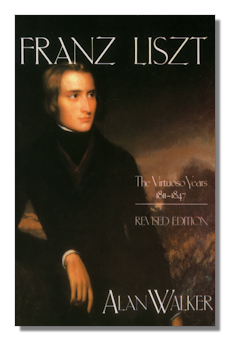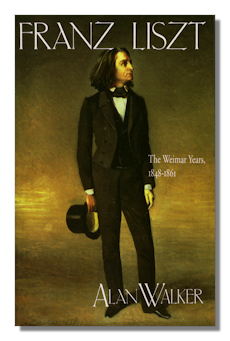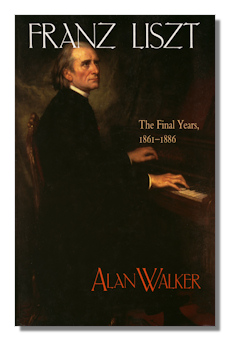
The Internet's Premier Classical Music Source
Related Links
-
Introduction
Acoustics
Ballet
Biographies
Chamber Music
Composers & Composition
Conducting
Criticism & Commentary
Discographies & CD Guides
Fiction
History
Humor
Illustrations & Photos
Instrumental
Lieder
Music Appreciation
Music Education
Music Industry
Music and the Mind
Opera
Orchestration
Reference Works
Scores
Thematic Indices
Theory & Analysis
Vocal Technique
Search Amazon
Recommended Links
Site News
 Book Review
Book Review
Franz Liszt

Volume 1:
The Virtuoso Years, 1811-1847
Alan Walker
Cornell University Press, Revised edition (October 1987), pp xxv + 484
ISBN-10: 0801494214
ISBN-13: 978-0801494215


Volume 2:
The Weimar Years, 1848-1861
Alan Walker
Cornell University Press, Nov 1993, pp xvii + 626
ISBN-10: 0801497213
ISBN-13: 978-0801497216


Volume 3:
The Final Years, 1861-1886
Alan Walker
Cornell University Press, 1997, pp xx + 594
ISBN-10: 0801484537
ISBN-13: 978-0801484537
Franz Liszt was born 200 years ago this year, in 1811. There is a Liszt bibliography lengthy to match his staggering output of compositions – and his full and interesting life. But the project under consideration here tends to dwarf the rest by itself. It is a project, rather than a mere biography, for Alan Walker's three volume narrative, analysis and assessment of Liszt surely illustrates the maxim that "It takes a life to study a life". It ranks among the most thorough, authoritative and informative musical biographies of any composer – in scope, in comprehensiveness, in readability, in detail; above all in providing insights into why and how (in addition, of course, to where and when) Liszt was the extraordinary phenomenon that he was.
Originally published over the dozen plus years from 1983, the first volume in Walker's three part biography alone took over ten years to write. Walker was also working for the Music Division of the BBC, contributing other articles (including that on Liszt in Grove), even writing other books – and teaching at various times (as Distinguished Visiting Professor of Music at City University in London between 1984 and 1987; he was also Professor of Music at McMaster University in Hamilton, Ontario, chairing the Music Department, for example, between 1989 and 1995) during the completion of this massive work. Born in 1930, Walker had the advantage as biographer of also being a performing musician, having studied privately with Hans Keller and with Alfred Nieman at the Guildhall School of Music, where too he subsequently taught.
The three volumes consist of over nearly 1,700 pages of substantive text and took a total of a quarter of a century to write. The phases of Liszt's life into which Walker chose to divide it are from birth to 1847, when Liszt the performing prodigy took Europe by storm. From 1848 to 1861, when he lived in Weimar and had such a profound influence on the cultural life of Germany from there, and an even longer-lasting one on the development of music – particularly with the composition of a dozen tone poems. And in old age from 1861 until his death in 1886, times of great personal sadness with the death of his son and daughter and his semi-retreat into the seclusion required by the holy orders; yet during these years Liszt lived an equally extraordinary life, or rather three lives (his "vie trifurquée", as he called it): teaching, performing and traveling (at least 4000 miles a year, between Rome, Weimar and Budapest).
Walker's apparent motive for tackling such a huge and consuming undertaking was the absence of any creditable study of Liszt. Indeed a plethora of myth and misinformation about the composer (dating, really, from his own lifetime) existed, which Walker felt sure detracted from his appreciation. He had no illusions about the need to confront that with indisputable facts at every turning. Nor that – given Liszt's peregrinations – such (documentary) sources would require special and more painstaking work than usual to find, collate, assess and analyze. As the books were published, they received accolades, won awards and became accepted as the single leading authority on Liszt. Walker was eventually awarded the Commemorative Plaque from the Budapest Liszt Society for his contributions to Liszt scholarship and the medal of the Hungarian Minister of Culture in 1986.
What, then, makes this study so exceptional? Firstly, the fact that Walker is a musician in his own right, and a teacher. He has described teaching (of which this kind of highly informative writing must be considered a part) as his "first love". His expertise in these areas affords him indisputable skills of communication. And insights into the ways in which composers in general, the Romantics in particular, and specifically Liszt (though Walker has also published on Chopin and Schumann) think and work. The academic life, of course, required rigor and discipline to which Walker is also temperamentally suited… one can now only marvel at the colossal enterprise of assembling and managing the many thousands of running footnotes and bibliographical cross-references that so amply support these volumes.
If you accept the premise that, specious celebrity as seen from this century aside, Liszt was such a fascinating and vibrant figure, and at the same time so essentially human and that his achievements were so significant for music, then it follows that the details of his life are of probable automatic interest. Indeed, it seems at times as though Walker knew what Liszt was engaged in on almost every day of his 75 years. In the wrong hands, though, even the particularities of someone as colorful as Liszt could be mishandled and become either tedious or prurient, irrelevant or sophistic. Alan Walker, though, is expert at sifting, relocating, stretching and contextualizing such a mass of data. The way in which the three volumes of this outstanding biography are constructed also aids its reading: short segments; typographically astute layout of quotes, for example; judicious use of illustrative material; and an inviting mixture (more than you might expect) of contrast between straight prose and the many other forms of material which are necessary in painting the rich picture which emerges.
On the other hand, although the book is carefully segmented chronologically into three, four and four "books" in each volume and internally to those into between half a dozen and a dozen or more numbered divisions, Walker's consistent and consistently suave style makes the biography extremely approachable. This has the twin benefits of making the narrative easy to navigate (the index is excellent) and at the same time of slowly producing small, often self-contained, episodes that can be referred to in explaining how and why Liszt's life developed as it did… "The Danube overflows its banks", "Louis Lavenu, Liszt's English impresario, goes bankrupt", "[Liszt's] concerts in Madrid, Seville and Lisbon".
It should not be thought that the result of this monumental work of Walker's is in any way disjointed or fragmented. His great skill as a biographer is to know (seemingly ahead of time; which, of course it is) the relevance and context of any one phase, event or development in Liszt's life and work. And successfully to situate everything that's covered not only in such ways that it all makes sense; but also that the narrative as a whole is entire, logical and suitably comprehensive, for all the potential for denseness.
The three volumes have much appropriate "reference" material: a concordance of the almost 50 villages, towns and cities relevant to Liszt's life, their names and original and present (official) geographical locations etc; a family tree and surveys of other literature, wills, sources consulted and so on. Illustrations are dispersed in the body of the text as needed and extend from manuscript facsimiles to maps to actual photographs. There are fewer score extracts than one might expect given Walker's accent on Liszt's music as much as his life. But this is no detriment.
The real strength, then, is that Walker has succeeded extraordinarily well at matching, blending, marrying factual narrative with (musical) analysis; he thereby provides a striking insight into not only the import of Liszt, but also its wider impact. This happens almost entirely as a result of primary sources. That is, of course, a key feature of all good biographies. But when speculation takes over from dissection, such solidity and ordering, ranking of developments in the composer's achievement and significance that's always far from tendentious as is present on every page of this work by Walker often goes by default.
If you want the single best study of Franz Liszt, and one at a surprisingly reasonable price at that, Alan Walker's study is the one to get. It has won numerous awards, understandably, and can be recommended without a moment's hesitation. It's a long undertaking to read from 1811 (or rather, from the chapters on Liszt's family background) to his death (and, again, the musical context of his surviving family members). But it's also sufficiently readable to make even bedtime reading as much as responding to the work as a scholarly study. Enjoyable. Illuminating. Gripping. Definitive.
Copyright © 2011 by Mark Sealey.



















